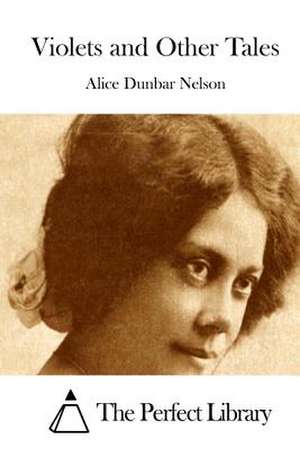Violets and Other Tales
Autor Alice Dunbar Nelson Editat de The Perfect Libraryen Limba Engleză Paperback
| Toate formatele și edițiile | Preț | Express |
|---|---|---|
| Paperback (3) | 32.97 lei 3-5 săpt. | |
| Mint Editions – mai 2021 | 32.97 lei 3-5 săpt. | |
| CREATESPACE – | 95.57 lei 3-5 săpt. | |
| Read & Co. Classics – aug 2012 | 107.08 lei 6-8 săpt. |
Preț: 95.57 lei
Nou
Puncte Express: 143
Preț estimativ în valută:
18.29€ • 19.56$ • 15.25£
18.29€ • 19.56$ • 15.25£
Carte disponibilă
Livrare economică 27 martie-10 aprilie
Preluare comenzi: 021 569.72.76
Specificații
ISBN-13: 9781511849883
ISBN-10: 1511849886
Pagini: 110
Dimensiuni: 152 x 229 x 6 mm
Greutate: 0.16 kg
Editura: CREATESPACE
ISBN-10: 1511849886
Pagini: 110
Dimensiuni: 152 x 229 x 6 mm
Greutate: 0.16 kg
Editura: CREATESPACE
Notă biografică
Alice Dunbar Nelson (1875-1935) was an African American poet, journalist, and political activist. Born in New Orleans to a formerly enslaved seamstress and a white seaman, Dunbar Nelson was raised in the city¿s traditional Creole community. In 1892, she graduated from Straight University and began working as a teacher in the New Orleans public school system. In 1895, having published her debut collection of poems and short stories, she moved to New York City, where she cofounded the White Rose Mission in Manhattan. Dunbar Nelson married poet Paul Laurence Dunbar in 1898 after several years of courtship, but their union soon proved abusive. She separated from Dunbar¿whose violence and alcoholism had become intolerable¿in 1902, after which Nelson taught at Howard High School in Wilmington, Delaware for around a decade. She continued to write and earned a reputation as a passionate activist for equality and the end of racial violence. Her one-act play My Eyes Have Seen (1918) was published in The Crisis, the journal of the NAACP. Dunbar Nelson settled in Philadelphia in 1932 with her third husband Robert J. Nelson and remained in the city until her death. Her career is exemplified by a mastery of literary forms¿in her journalism, stories, plays, and poems, she made a place for herself in the male-dominated world of the Harlem Renaissance while remaining true to her vision of political change and social uplift for all African Americans.
